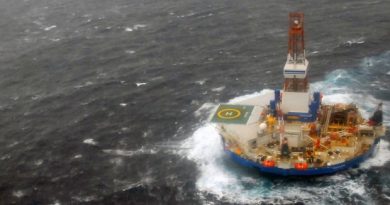Alaska military sites vulnerable to climate change

Several U.S. military sites are vulnerable to rising temperatures and seas as well as other impacts of climate change, and the Department of Defense should do more to protect its facilities, said a federal report issued Monday by the Government Accountability Office.
The report examined 15 military facilities around the nation, including several in Alaska. Investigators worked for a year to assess climate change impacts at those sites and the military’s work to adapt and protect infrastructure.
The stakes are high, considering that “the federal government’s role as a property owner exposes it to significant fiscal risk,” the report said. The DOD has 550,000 facilities covering 28 million acres with an estimated replacement value of about $850 billion, the report said.
Most of the 15 military sites examined had been affected by some climate-related problems, such as increased wildfire and flood damage. Alaska facilities assessed included Fort Wainwright, the Yukon Training Area, the Joint Pacific Alaska Range Complex and 611th Civil Engineer Squadron remote radar sites. Other sites in California, Virginia, Hawaii and Guam also were evaluated.
Flooding at Fort Irwin Damaged Department of Defense Infrastructure:
Damaged roads
In Alaska, thawing permafrost has damaged gravel roads to military training sites, with repairs to two roads costing more than $500,000, the GAO report said. Rapid coastal erosion was threatening early-warning radar sites on the Arctic coastline, too.
There were climate-related problems in warm-weather sites as well: more storms, flooding and rapid marine changes, among them. At one site, coastal changes had prompted a population of protected turtles to nest in an area formerly used for military training, the report said.
The Pentagon had already taken several “positive steps” to plan for climate change and the threats to infrastructure. But the DOD still lacks a project plan to ensure that goals are met, the GAO said.
The report recommended that such a plan be put in place so that the department can comprehensively screen climate vulnerabilities, speed the collection of data and better protect facilities.
Future military construction should also consider climate-change vulnerabilities, the report said.
Sen. Mark Begich, one of five senators who requested the GAO report, said it confirms that climate-change problems are evident in Alaska. “The military owns a lot of real estate around Alaska, real estate that is essential to keeping America safe and secure and keeping our troops well prepared,” he said in a statement. “The military is important to Alaska, and Alaska is important to the military. We need to get in front of these changes to protect the taxpayer, keep costs low, and keep Alaska ready to support the larger mission.”
Contact Yereth Rosen at yereth(at)alaskadispatch.com
Related stories from around the North:
Canada: Rare World Series footage found in Yukon permafrost, Radio Canada International
Finland: Broad backing for climate protection law in Finland, Yle News
Greenland: Natural forces team up with human-caused warming to bake Greenland/Canadian Arctic:study, Alaska Dispatch
Iceland: Eco-group questions Iceland oil, Deutsche Welle – Iceblogger
Norway: UN names Norway’s ex-PM and Ghana’s ex-president as climate envoys, Associated Press
Russia: Virus revived from ancient permafrost in Siberia, CBC News
Sweden: How should Swedes adapt to climate change?, Radio Sweden
United States: Alaska Highway permafrost gradually disappearing: study, Alaska Dispatch



